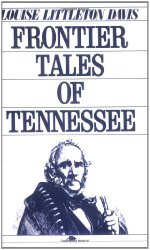
Louise Littleton Davis, historian and journalist, was born in Paris, Tennessee, one of the five children of Grover C., a career United States army officer, and LaRue Littleton Davis, a musician. Although born in Paris, she left the state at an early age. She was educated in the public schools of St. Louis, at Washington University, the University of North Carolina, and Vanderbilt, where she earned a Master of Arts degree.
Davis’ journalistic career began in 1943 covering the Tennessee legislature for the Associated Press. At the close of that session she joined the staff of the Nashville Tennessean. Miss Davis soon became a feature writer noted for the careful craftsmanship of her writing and the warm human interest of her stories. As a reporter she covered topics ranging from agriculture to juvenile crime; then she moved to the newspaper’s magazine where she became well known for her knowledge of history and love of research. Exceptionally skilled at oral interview, Davis talked with persons from all walks of life, including Harry Truman, Lord Halisham, Anthony Eden, Gregor Piatigorsky, and Cardinal Stritch. She reported from the Netherlands, England, France, and many other nations. Semi-retiring in 1977, she continued working part-time at the newspaper until 1984.
In the 1950s Silliman Evans, who had come from Texas as publisher of Nashville Tennessean, encouraged Davis to write local history out of a belief that Tennesseans did not realize or appreciate the richness of their past. Her books include Nashville Tales, More Nashville Tales, Snowball Fight in the White House, Children’s Museum of Nashville: The First 30 Years, Frontier Tales of Tennessee and More Tales of Tennessee. At the time of her death she was writing a biography of Captain William Driver for the Smithsonian Institution.
In 1987 Davis was unanimously elected Davidson County historian. She was credited with sparking the movement that preserved the Union Station from demolition and with the establishment of the Friends of Metro Archives. She also served on the Metropolitan Nashville Historical Commission, the Tennessee Historical Society, the Query Club, and the Association for the Preservation of Tennessee Antiquities. She was a charter member of the Cheekwood Fine Arts Center and the Nashville Symphony Association. She died at her home in Nashville on September 7, 1995.
Selected Bibliography
Snowball Fight in the White House (fiction), 1974
Frontier Tales of Tennessee (nonfiction), 1976
More Tales of Tennessee (nonfiction), 1978
Nashville: The Faces of Two Centuries, 1780-1980 (with John Egerton) (nonfiction), 1979
Nashville Tales (nonfiction), 1981
Selected Links
Louise Littleton Davis’s page in the Tennessee Encyclopedia of History and Culture: http://tennesseeencyclopedia.net/imagegallery.php?EntryID=D014
Louise Littleton Davis’s profile at UTC’s Tennessee Writers Page: http://www.utc.edu/Academic/TennesseeWriters/authors/davis.louise.html





